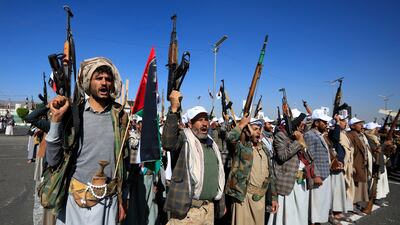Live updates: Follow the latest on Israel-Gaza
The latest US-led naval coalition will "do little" to deter Houthi attacks on vessels in the Red Sea, analysts have said, warning of further escalation in the strategic waters.
The warnings came as the US pushes forward with plans to use force against the Iran-backed rebels, who continue to attack ships in support of their ally Hamas in the Gaza Strip where thousands have been killed in the Israeli offensive against the militant group.
Several countries, led by the US, agreed on Monday to jointly carry out patrols in the southern Red Sea and Gulf of Aden to safeguard commercial shipping after many companies decided to halt their operations in the region.
Some of the countries had already been part of existing task forces in the region.
"I don’t think the Houthis can be deterred," Michael Horowitz, head of intelligence at Le Beck International, a Bahrain-based think tank, told The National.
"If anything, the presence of a coalition that includes mostly countries outside the region will boost the group domestically and allow it to quell domestic unrest.
"This coalition may be purely defensive but if it does take some more offensive actions, I expect the goal will not be deterrence."
US Defence Secretary Lloyd Austin, during a visit to Bahrain on Monday and Tuesday, said countries including the UK, Canada, France, Italy, the Netherlands, Norway, Seychelles and Spain will take part in Operation Prosperity Guardian, also known as the new Combined Task Force 153 (CTF-153).
Bahrain is the only Arab country in the international force as part of CTF-153.
US warships have in recent days shot down Houthi missiles and drones and rushed to the aid of commercial ships under attack. At the same time, Western officials told The National that Washington was discussing the possibility of striking Houthi targets in the war-torn Yemen.
The Iran-backed group has waded into the Israel-Hamas conflict by attacking vessels in vital shipping lanes and even firing drones and missiles at Israel, more than 1,600km from their seat of power in the Yemeni capital of Sanaa.
Mr Horowitz said the end goal would be to gradually reduce Houthi capabilities, including by striking weapons depots, its fleet of fast attack boats and rocket launchers.
However, the heavily armed militia responded to the announcement regarding the task force by emphasising this would not stop it from continuing its attacks.
"The American-formed coalition is to protect Israel and militarise the sea without any justification, and will not stop Yemen from continuing its legitimate operations in support of Gaza," Houthi spokesman Mohammed Abdelsalam said on Tuesday.
Gulf-based analysts told The National the US could be "misguided" in its policy regarding the Houthis, choosing to be reactionary rather than having challenging discussions with Gulf allies regarding the group's recent actions as part of the Israel war on Gaza.
"The US is shooting itself in the foot and I have not seen this degree of misguided US policies in a successive manner," Bader Alsaif, a history professor at Kuwait University, told The National.
"All they need to do is listen to the stakeholders on the ground. Listen to the people, to policymakers and go after the root cause of the issue. The issue is you're not calling for a ceasefire. This is the main issue."
News of the new task force has reassured shipping companies, who believe US naval forces must safeguard maritime navigation regardless of political developments.
"Previously, we saw assets in the region operating independently against the threat, whereas now we have a co-ordinated effort across a large number of military assets that will provide a significant suppressive response," John Stawpert, senior manager at the International Chamber of Shipping, told The National.
"That said, we still believe those powers that can bring pressure to bear on the Houthis should do so to de-escalate what is an unacceptable security situation in the region."
Mr Alsaif said the naval task force expansion feeds into the Houthi rebels' plans and narrative.
"If anyone is going to be celebrating this task force, it's going to be the Houthis more than anyone else, because they're calling for the fight."
Dr Yoel Guzansky, a senior researcher at Israel’s Institute for National Security Studies, said Israel "wisely decided to outsource the effort against the Houthis.
“If Israel attacked the Houthis, it would immediately be labelled an Israeli issue and could start an escalation with the group that would be hard to stop. That in turn would risk opening up another front.
"Israel should focus on Gaza right now and not divert attention and capabilities elsewhere.”

